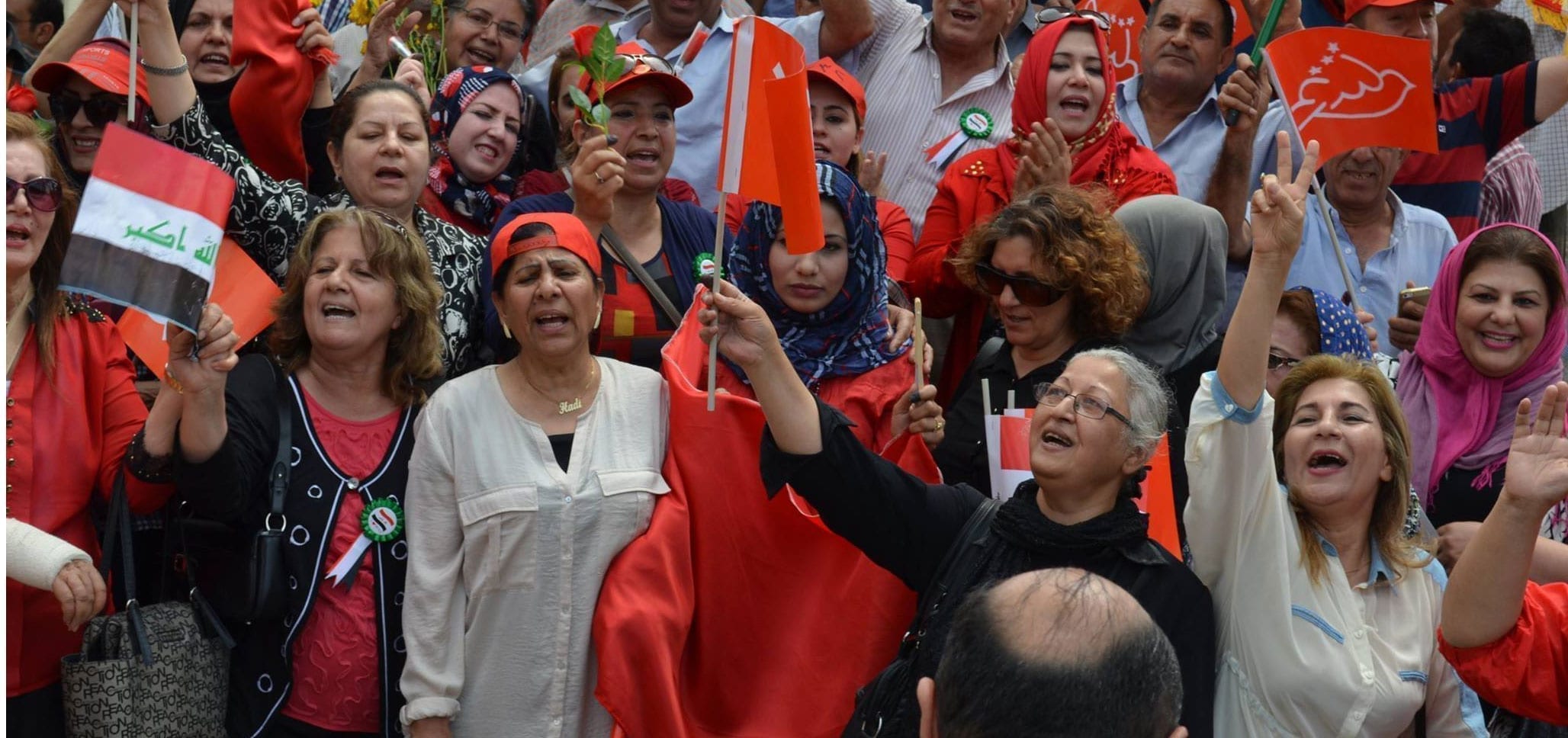
Mar 23, 2016
Women workers made important gains under Iraq’s new labor law, the country’s first ever to prohibit sexual harassment at the workplace. The law clearly defines sexual harassment and specifies penalties for perpetrators. Women union activists led their unions in fighting for this protection.
“The law also addresses the arbitrary dismissal of workers and other issues that will serve the interests of working women, which should encourage more women to work and enjoy those protections and rights,” says Saba Qasim Yousef, an officer in the women’s affairs department of the Iraqi Federation of Oil Unions (IFOU). Yousef was among many women taking an active role in the union movement’s labor law campaign.
Crucially, the law aims for gender equality, specifically regarding wages, hiring and working conditions. It requires employers to provide onsite child care, and increases paid maternity leave to 14 weeks, with the option of additional unpaid leave for up to a year. Employers must allow woman workers to return to their jobs or equivalent positions.
In effect on February 1, the law was a massive victory for Iraq workers and their unions and followed the Iraq union movement’s three-year campaign for passage of a labor law in line with International Labor Organization (ILO) conventions. The Solidarity Center provided essential support to the union movement throughout the campaign.

Iraq’s labor law includes protection against workplace sexual harassment. Credit: GFITU
Women Union Members Took Key Role in Drafting Labor Law
The labor law’s provisions addressing gender equality came about because women union activists and leaders participated in all aspects of the campaign—drafting amendments, taking part in conferences and meetings with parliament and the Ministry of Labor and Social Affairs (MoLSA) and advocating for its passage.
“Women had a leading role in the campaign to restructure the law draft by participating in the workshops and seminars,” says Ilham Abdul Ma’boud Majid, president of the Telecommunications Union, General Federation of Workers and Unions in Iraq (GFWUI), Basra Branch.
“Also, they were watching the developments in the process, despite their obligations as employees and mothers at home and the long distances they needed to travel to attend those activities,” she said. “They were motivated by the idea of having a modern labor law that will protect them from all kinds of discrimination.”
Labor Law Will Encourage Women to Join Workforce
The law’s new protections “will have a positive impact in increasing the number of women workers and guaranteeing their strong presence in the labor market, by treating them fairly at their workplaces with equality in terms of assignments and jobs,” says Alya’a Hussien Mahood, women’s affairs officer for the General Federation of Iraqi Trade Unions (GFITU).
The final draft, passed late last year, retained the unions’ input and is a significant victory for all workers because it expands coverage to workers not included in the civil service law. This means that workers in the public sector who are not civil servants have the chance to join and establish their own unions.
The law allows for collective bargaining, including for workers without a union, and provides a good frame for freedom of association and protections for unions and their members. It further limits child labor, improves rights for migrant workers, provides better protections against discrimination at work and is the country’s first legislation to address sexual harassment at work. The law also enshrines the right to strike, banned since 1987. (Highlights of the law’s improvements.)
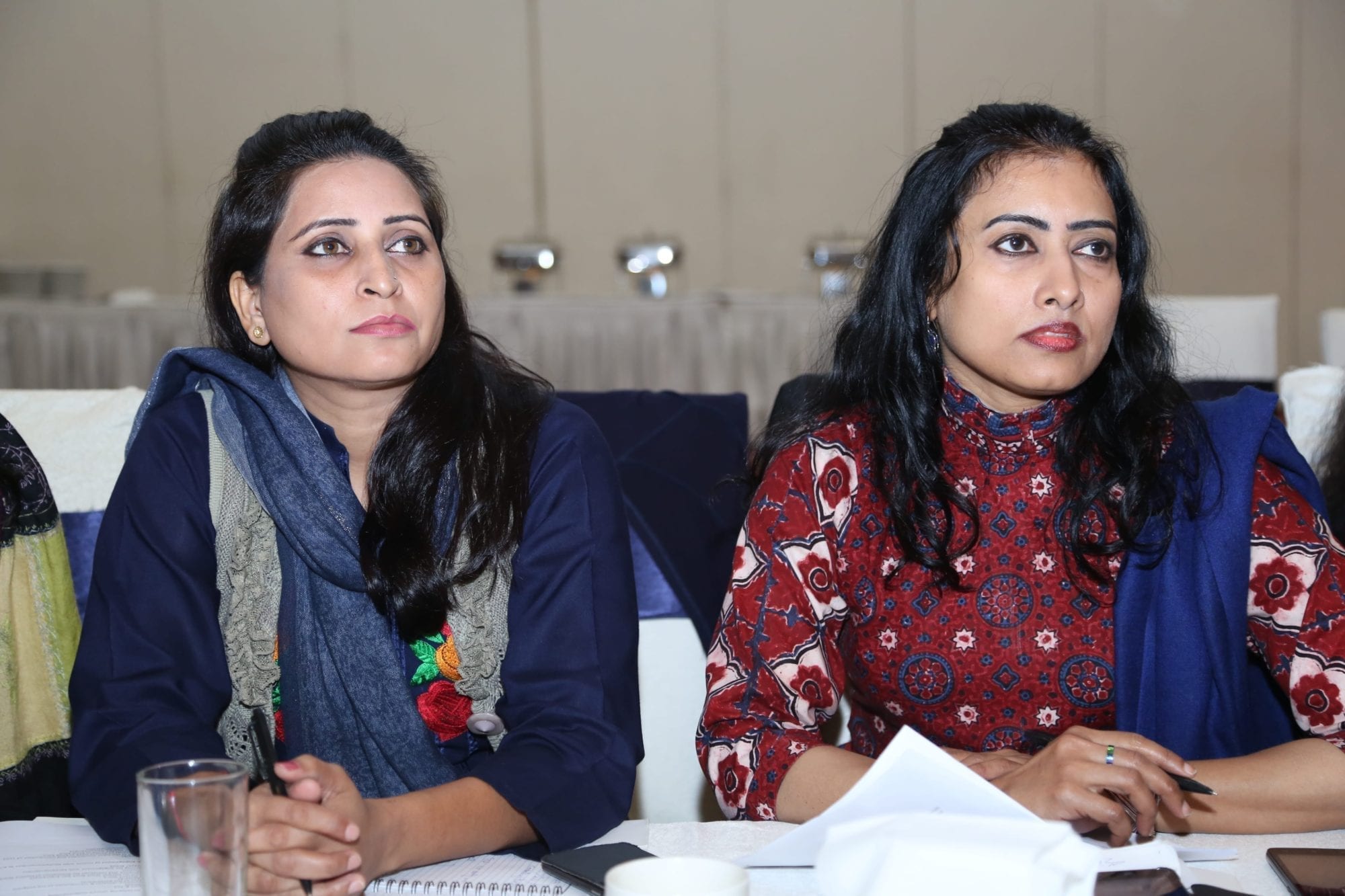
Mar 21, 2016
The effort to secure decent work in Pakistan’s brick kiln industry took a step forward in recent weeks when 18 women parliamentarians vowed to take up the issue in the Punjab Legislature. The move followed their participation in a discussion organized by the Solidarity Center for the Trade Union Female Forum (TUFF). TUFF, a program the Solidarity Center piloted to bring together female labor activists, comprises women union leaders and members of Pakistan Workers Federation and Muttahida Labor Federation.
The late February meeting centered on the proposed Decent Work Brick Kiln–Framework, which provides an inspection checklist to monitor work at kilns along with other comprehensive tools and resources for district labor departments that have not had the mechanisms to systematically inspect and report on labor law violations or the status of brick kiln compliance.
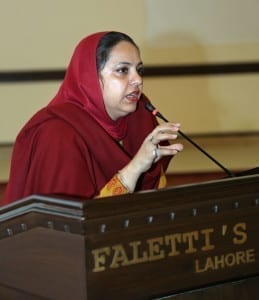
TUFF members outlined steps the Punjab government can take to ensure decent working conditions in brick kilns. Credit: Solidarity Center/Roshan
The Solidarity Center, together with allies in the country, developed the detailed framework as a roadmap for local labor departments to address bonded labor and unsafe working conditions. The program also includes incentives for employers to ensure their facilities meet decent work standards.
Meeting with the parliamentarians, some 30 women trade union leaders and 10 senior male leaders from the two federations highlighted the absence of labor inspections at brick kilns, the lack of formal contracts for brick kiln workers, non-payment of minimum wages to brick kiln workers and the prevalence of debt bondage and other worker exploitation.
The MPs and union leaders discussed options for ensuring decent working conditions for brick kiln workers, including:
- Increasing enforcement powers of labor inspectors in Punjab province, and adding women inspectors.
- Organizing extensive training for labor inspectors around the decent work framework.
- Ensuring transportation for labor inspections to verify compliance with the framework.
- Demanding the government procure bricks for infrastructure projects only from decent work compliance brick kilns.
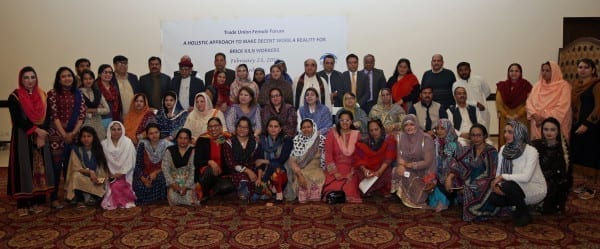
Punjab MPs told members of Tuff they will pursue the issue of decent work in the legislature. Credit: Solidarity Center/Roshan
The MPs also suggested organizing more dialogue and workshops to educate MPs on worker issues, especially when such meetings are centered on results-oriented solutions like DWBK framework.
The Punjab provincial government recently passed a regulation prohibiting child labor at brick kilns, which covers those under age 15. The Pakistan Senate also unanimously passed a bill last week that would give domestic workers protections on the job. While the domestic worker legislation needs to be passed by the full National Assembly and further passed by individual provinces, the action is a big step forward for the rights of domestic workers.
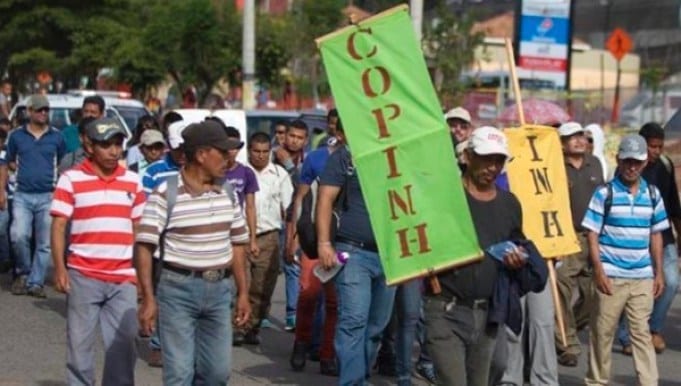
Mar 18, 2016
The murder of a second Honduran rights activist, Nelson Noé García this week, days after the assassination of Berta Cáceres, a globally recognized leader for indigenous rights and environmental justice, has widened international outrage and amplified demands for justice, security, respect for basic rights and an end to impunity for perpetrators.
The Center for International Justice and Rights strongly condemned Nelson’s murder. Marcia Aguiluz, CIJR director for Central America and Mexico, said it “proves that the spiral of violence against indigenous peoples fighting for their territories in Honduras remains with impunity.”
García, 38, a father of five, was a member of the Council of Indigenous and Popular Organizations of Honduras (COPINH), co-founded by Cáceres. Local media report that García received four gun shots to the face and suggest the attack followed the forceful eviction of at least 150 families in the village of Tilapia by military police.
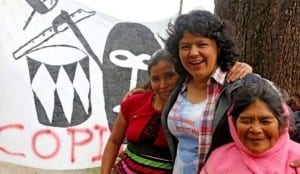
Berta Cáceres (center), murdered March 3, won the prestigious Goldman Environmental Prize for her opposition to one of the region’s biggest hydroelectric projects. Credit: Democracy Now!
The same day as García’s murder, the president of Unified Campesino Movement of the Aguán, another indigenous group, was briefly arrested on questionable charges; Cristián Alegría, a campesino activist, was shot at; and David Romero, a journalist critical of the government, was sentenced to 10 years in prison. In addition, Gustavo Castro, a Mexican activist who witnessed Cáceres’s murder, has been prevented from leaving the country.
Targeted murders of human rights activists and union members have helped make Honduras one of the most dangerous countries in the world for human rights defenders.
Union activists are targeted to silence demands for economic justice, freedom of association and other basic rights. Over the past 12 months, the Solidarity Center has documented 13 cases of threats or violence against union activists, including the disappearance of Donatilo Jiménez in April 2015, the murder of Héctor Martínez Motiño in June, and repeated death threats against longtime Solidarity Center allies Tomas Membreno and Nelson Geovanni Nuñez Chávez, both of the Sindicato de Trabajadores de la Agroindustria y Similares (STAS) industrial agricultural workers’ union.
In the United States, more than 60 Congress members yesterday asked Secretary of State John Kerry and Treasury Secretary Jacob Lew to suspend aid to Honduras security until an international investigation into the murder of Cáceres.
The Inter-American Commission on Human Rights had mandated “precautionary measures” to protect Cáceres, Motiño and Jiménez—which were not borne out in practice. This week, 23 U.S. Congress members sent a letter to U.S. Secretary of State John Kerry urging the State Department to take concrete action to address the situation of activists in Honduras.
The AFL-CIO has expressed deep concern with human rights and sustainable development in Honduras based on the findings of an October 2014 labor delegation that met with labor and community organizations, the Honduran government and the U.S. embassy.
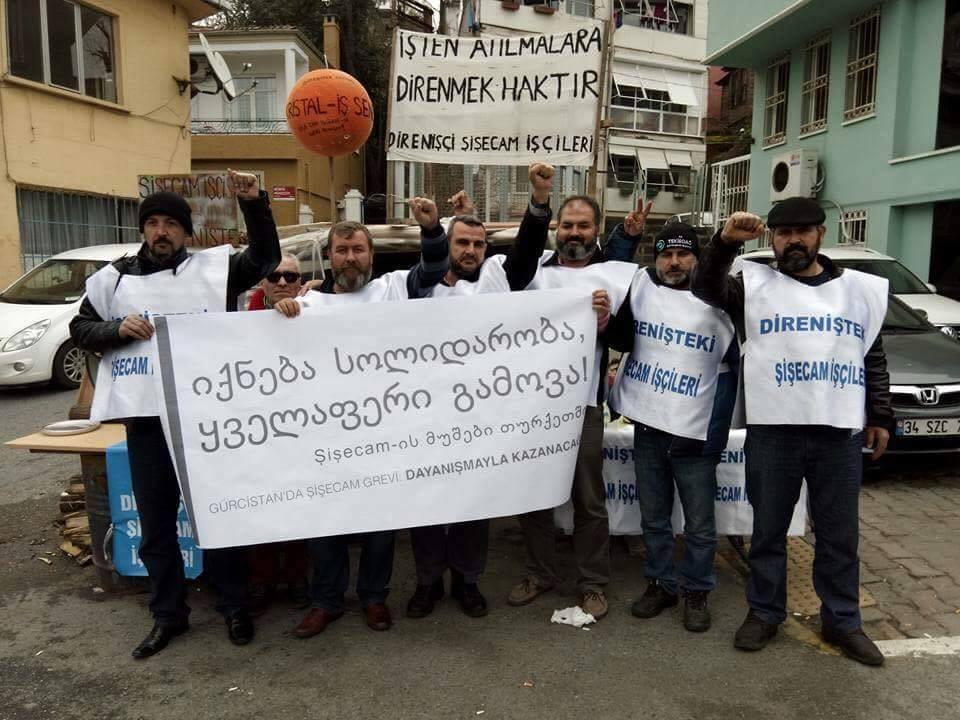
Mar 17, 2016
In Georgia, coal miners in Tkibuli and glass factory workers in Ksani recently made big gains at the workplace with the assistance of the Metal Workers, Miners and Chemical Industry Workers’ Trade Union (MMCIWTU) and the Georgian Trade Unions Confederation (GTUC).
Despite tough opposition from their employers, both groups of workers waged successful strikes and won significant wage increases, with miners also gaining key job safety and health improvements.
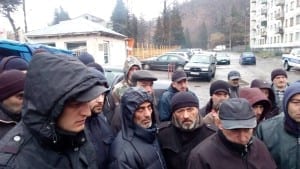
Miners in Georgia won key contract demands, including a wage increase and improved job safety and health. Credit: MMCIWTU
Some 750 miners went on strike in February, seeking wage increases promised during their last strike in 2011. The workers, employed by the Georgian Industrial Group (GIG), which operates two mines in Tkibuli, walked out before notifying union leadership of their intention.
But with GTUC President Irakli Petriashvili and MMCIWTU President Tamazi Dolaberidze at the bargaining table, miners returned to work in 16 days with a new contract that includes a 7 percent pay increase starting March 1 and an additional 3 percent hike beginning April 1—and will be paid for half of the days they spent on the strike with no punishment for strike leaders. The company also has agreed to address salary imbalances.
GIG supplies coal from Tkibuli primarily to cement-producing factories in Georgia and is one of the country’s largest corporations, with operations in energy generation, natural gas and real estate.
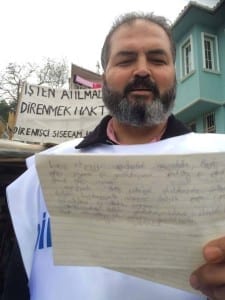
JSC Mina factory workers received wide international support for their strike. Credit: MMCIWTU
At the JSC “Mina” glass container factory, 170 workers—80 percent of the workforce—went on strike February 5 after months of contract negotiations which stalled when the company did not address workers’ key issues, including a wage increase.
Throughout the 30-day strike, glass workers won wide international support, with employees of the JSC Mina Turkey-based parent company, Sisecam, holding a solidarity action backing striking workers. The Sisecam workers also sent their Georgian brothers and sisters a message: “Workers of “Mina” are symbol of fight for just cause, wherever human rights are violated we should be there and fight together!”
The global union federation IndustriALL, the Eurasian Metal Workers Federation, the Turkish union DISK and unions in Ukraine, Russia, Belarus, and Kyrgyzstan sent protest letters to the company and support letters to the glass workers. GTUC affiliate organizations and non-governmental organizations also backed the workers.
Petriashvili and Dolaberidze ultimately negotiated a 7.5 percent pay increase beginning January 1, 2017, and the company agreed to the workers’ demand for a location to hold union activities.
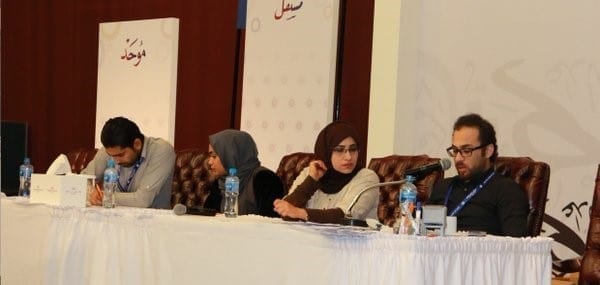
Mar 16, 2016
Even as trade union representatives from Tunisia and other trade unionists were barred from entering Bahrain to attend the General Federation of Bahrain Trade Unions (GFBTU) Congress, hundreds of union members participated in open, spirited discussions and held free elections, capped by the secretary-general’s call for continuing the democratic process.
“It is time for the democracy you and I believe in, and are called to implement, to take its course—the democracy that we have made a symbol and principle,” said GFBTU General Secretary Sayed Salman Al-Mahfood.
Mahfood, who stepped down along with three leaders who helped found the federation in 2004, said democracy means “leaving while enjoying the capacity to give.”
Four women are among the 15 newly elected members of GFBTU’s secretariat.
The democratic elections took place in a difficult environment. Just this week, Bahraini human rights activist Zainab Al Khawaja was arrested, along with her 15-month-old son, Abdul-Hadi. The arrest follows the fifth anniversary of pro-democracy uprising in February 2011.
Although Bahrain still lacks democratic practices, GFBTU has presented an alternative with its March 5-7 Congress as an example.
“What I saw was a living example of democratic practices that included thousands of workers in Bahrain,” says Nader Tadros, Solidarity Center Regional Program Director for the Middle East and North Africa.











